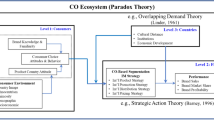Abstract
The debate on the influence of markets on virtues has focused on two opposite hypotheses: the doux commerce thesis and the self-destruction thesis. Whereas the doux commerce hypothesis assumes that capitalism polishes human manners, the self-destruction hypothesis holds that capitalism erodes the moral foundation of society. This paper will develop a more balanced position by using the virtue ethics developed by Aristotle, which distinguishes several virtues. The research will focus on the question for which virtues the doux commerce or self-destruction thesis is likely to hold. An extensive literature survey shows that market competition tends to stimulate diligence, crowd out temperance, generosity, and sociability, and stimulate envy. The effect on other virtues – i.e. courage, high-spiritedness, justice, and prudence – is ambiguous.
Similar content being viewed by others
References
Alesina, A. and E. La Ferrare: 2002, ‹Who trusts others?’, Journal of Public Economics 85, 207-34.
Alpizar, F., F. Carsson and O. Johansson-Stenman: 2005, ‹How much do we care about absolute versus relative income consumption?’, Journal of Economic Behaviour & Organisation 56, 405-21.
Aristotle: Ethica Nicomachea (Historische Uitgeverij, Groningen)
Berggren, N.: 1999, ‹Economic freedom and equality: Friends or foes?’, Public Choice 100, 203-23.
Berggren, N. and H. Jordahl: 2006, ‹Free to trust: Economic freedom and social capital’, Kyklos 59(2), 141-69.
Bizjak, John M., Brickley, James A. and Coles, Jeffrey L.: 1993, ‹Stock-based incentive compensation and investment behavior’, Journal of Accounting and Economics 16, 349-372.
Bloom, M.: 1999, ‹The performance effects of pay dispersion on individuals and organizations’, The Academy of Management Journal 42, 25-45.
Bloom, M. and J.G. Michel: 2002, ‹The relationships among organizational context, pay dispersion and managerial turnover’, Academy of Management Journal 45, 33-42.
Bovenberg, A.L.: 2000, ‹On the cutting edge between policy and academia: challenges for public economists’, De Economist 148, 295-329.
Bovenberg, A.L.: 2002, ‹Norms, values and technological change’, De Economist 150, 521-553.
Bovenberg, L.: 2007, ‹Boekbespreking’, Christen Democratische Verkenningen 28(3), 166-70.
Bowles, S.: 1998, ‹Endogenous preferences: The cultural consequences of markets and other economic institutions’, Journal of Economic Literature, XXXVI, 75-111.
Brekke, K.A. and R.B. Howarth: 2002, Status, Growth and the Environment; Goods as Symbols in Applied Welfare Economics (Edward Elgar, Cheltenham).
Brown, Lawrence D. and Higgins, Huong Ngo: 2001, ‹Managing earnings surprises in the US versus 12 other countries’, Journal of Accounting and Public Policy 20, 373-398.
Bruni, L. and L. Stanca: 2006, ‹Income aspirations, television and happiness: Evidence from the World Values Studies’, Kyklos 59, 209-25.
Carlsson, F., O. Johansson-Stenman and P. Martinsson: 2003, Do You Enjoy Having More Than Others? Survey Evidence on Positional Goods (Goteborg University, Working Papers in Economics, no. 100)
Carmon, Z., K. Wertenbroch and M. Zeelenberg: 2003, ‹Option attachment: when deliberating makes choosing feel like losing’, Journal of Consumer Research 30, 15-29.
Choo, F. and K. Tan: 2007, ‹An American dream theory of corporate executive fraud’, Accounting Forum 31, 203-15.
Crisp, R.: 2003, ‹Equality, priority and compassion’, Ethics 113, 745-63.
Dawson, J.W.: 1998, ‹Institutions, investment, and growth: New cross-country and panel data evidence’, Economic Inquiry XXXVI, 603-19.
Haan, J. de and J.E. Sturm: 2000, ‹On the relationship between economic freedom and economic growth’, European Journal of Political Economy 16, 215–41.
Easton, Steven T., and Michael A. Walker: 1997, ‹Income, growth, and economic freedom’, American Economic Review 87(2), 328–32.
Florida, R.: 2002, The rise of the creative class. And how it’s transforming work, leisure, community and everyday life (Basic Books, New York).
Frey, B.: 1998, Not Just for the Money, an Economic Theory of Personal Motivation (Edward Elgar, Cheltenham).
Frey, B. S., C. Benesch and A. Stutzer: 2005, ‹Does Watching TV Make Us Happy?, Institute for Empirical Research in Economics’, University of Zurich, Working Paper 241.
Frey, B.S. and R. Jegen: 2001, ‹Motivation crowding theory’, Journal of Economic Surveys 15, 589-611.
Frey, B.S. and Oberholzer-Gee, F.: 1997, ‹The costs of price incentives: An empirical analysis of motivation crowding out’, American Economic Review 87, 746-55.
Galbraith, K: 1958, The affluent society (Houghton Mifflin Company, Boston).
Gay, C.M.: 2003, Cash values. Money and the erosion of meaning in today’s society (William B. Eerdmans Publishing Company, Grand Rapids).
Glaeser, E.L. and D. DiPasquale: 1999, ‹Incentives and social capital: Are homeowners better citizens?’, Journal of Urban Economics 45, 354-84.
Gneezy, U. and A. Rustichini: 2000, ‹Pay enough, or don’t pay at all’, Quarterly Journal of Economics 115, 791-810.
Goette, L. and M. Lienhard: 2006, ‹Productivity and Well-being under Fixed Wages and Piece Rates’, University of Zurich. Preliminary Draft. February 14, 2006. http://www.isu.unizh.ch/emap/docs/2006/poek/LienhardGoette.pdf
Goldberg, P. K. and N. Pavcnik: 2007, ‹Distributional effects of globalization in developing countries’, Journal of Economic Literature XLV(March), 39-82.
Golden, L. and B. Wiens-Tuers: 2006, ‹To your happiness? Extra hours of labor supply and worker well-being’, The Journal of Socio Economics 35, 382-97.
Graafland, J.J. : 2002 ‹Sourcing ethics in the textile sector: the case of C&A’, Business Ethics: A European Review 11, 282-294.
Graafland, J.J.: 2003, ‹Distribution of responsibility, ability and competition’, Journal of Business Ethics 35, 293-305.
Graafland, J.J.: 2007, Economics, ethics and the market: Introduction and applications (Routledge, London).
Graafland, J.J. and H. Smid: 2004, ‹Reputation, corporate social responsibility and market regulation’, Tijdschrift voor Economie en Management XLIX (2), 269-306.
Grant, R. and M. Visconti: 2006, ‹The strategic background to corporate accounting scandals’, Long Range Planning 39, 361-83.
Harrison, Jeffrey S. and James O. Fiet,: 1999, ‹New CEOs Pursue Their Own Self-Interests by Sacrificing Stakeholder Value’, Journal of Business Ethics 19, 301-308.
Henrich, J., R. Boyd, S. Bowles, C. Camerer, H. Gintis and R. McElreath: 2001, ‹Cooperation, reciprocity and punishment in fifteen small scale societies’, American Economic Review 91, 73-78.
Hirsch, F.: 1977, Social Limits to Growth (Routledge and Kegan Paul, London).
Hirschman, A.O.: 1982, ‹Rival interpretations of market society: Civilizing, destructive or feeble?’, Journal of Economic Literature XX, 1463-1484.
Inglehart, R.: 2000, ‹Globalization and postmodern values’, The Washington Quarterly 23, 215-28.
Iyengar, S.S. and M.R. Lepper: 2000, ‹When choice is demotivating: Can one desire too much of a good thing?’, Journal of Personality and Social Psychology 79, 995-1006.
Keil, Sev. K., Reibstein, David and Wittink, Dick R.: 2001, ‹The impact of business objectives and the time horizon of performance evaluation on pricing behavior’, International Journal of Research in Marketing 18, 67-81.
Klein, N.: 2002, No Logo (Lemniscaat, Rotterdam).
Knack, S. and P. Keefer: 1997, ‹Does social capital have an economic payoff? A cross-country investigation’, The Quarterly Journal of Economics 112, 1251-1288.
Koehn, D.: 1995, ‹A role for virtue ethics in the analysis of business practice’, Business Ethics Quarterly 5, 533-9.
Kreps, D.M.: 1997, ‹The interaction between norms and economic incentives. Intrinsic motivation and extrinsic incentives’, American Economic Review 87, 359-364.
Laverty, Kevin J.: 1996, ‹Economic “short-termism”: The debate, the unresolved issues, and the implications for management practice and research’, Academy of Management Review 21, 825-860.
Layard, R.: 2003, ‹Happiness – Has social science a clue?’, Lionel Robbins Memorial Lectures 2002/3, Centre for Economic Performance (London School of Economics and Political Science, London).
Layard, R.: 2005, Happiness: Lessons from a New Science (Penguin, New York).
Lindbeck, A.: 1995, ‹Welfare State Disincentives with Endogenous Habits and Norms’, OcfEB, Research Memorandum 9505.
Macneil, I.: 1986, ‹Exchange revisited: Individual utility and social solidarity’, Ethics 96, 567-593.
Maitland, I.: 1997, ‹Virtuous markets. The market as school of virtues’, Business Ethics Quarterly 7, 17-33.
Major, V.S., K.J. Klein and M.G. Ehrhart: 2002, ‹Work time, work interference with family, and psychological distress’, Journal of Applied Psychology 87, 427-36.
McCloskey, D. N.: 2006, Bourgeois virtues: Ethics for an age of commerce (The University of Chicago Press, Chicago).
McPherson, M., L. Smith-Lovin and M.E. Brashears: 2006, ‹Social isolation in America: Changes in core discussion networks over two decades’, American Sociological Review 71, 353-375.
Moore, G.: 2005, ‹Humanizing Business: A modern virtue ethics approach’, Business Ethics Quarterly 15, 237-55.
Novak, M.: 1982, The Spirit of Democratic Capitalism (Simon and Schuster, New York N.Y.).
Nozick, R.: 1974, Anarchy, State and Utopia (Basic Books, New York).
Orlitzky, M., F.L. Schmidt and S.L. Rynes: 2003, ‹Corporate social and financial performance, A meta-analysis’, Organization Studies 24, 403-41.
Putman, R.: 2000, Bowling Alone: The collapse and revival of American community (Simon and Schuster, New York).
Rappaport, A.: 2005, ‹The economics of short-term performance obsession’, Financial Analyst Journal 61, 65-79.
Rawls, J.: 1999, A Theory of Justice (revised edition) (Harvard University Press, Boston).
Rezaee, Z.: 2005, ‹Causes, consequences, and deterrence of financial statements fraud’, Critical Perspectives on Accounting 16, 277-98.
Richardson, Vernon J. and James F. Waegelein: 2002, ‹The Influence of Long-Term Performance Plans on Earnings Management and Firm Performance’, Review of Quantitative Finance and Accounting 18, 161-183.
Schwartz, B.: 2004, The paradox of choice (HarperCollins Publishers Inc, New York).
Scully, G.W.: 2002, ‹Economic freedom, government policy and the trade-off between equity and economic growth’, Public Choice 113, 77-96.
Segelod, Esbjörn: 2000, ‹A comparison of managers’ perceptions of short-termism in Sweden and the US’, International Journal of Production Economics 63, 243-254.
Shleifer, A.: 2004, ‹Does competition destroy ethical behavior?’, American Economic Review 94, 414-8.
Sider, R.J. 1997. Evaluating the triumph of the market. in: H. Ucko (ed.). The Jubilee challenge. Utopia or possibility? Jewish and Christian Insights. (World Council of Churches, Geneva), 112-133.
Solnick, S.J. and D. Hemenway: 1998, ‹Is more always better? A survey on positional concerns’, Journal of Economic Behavior & Organization 37, 373-83.
Solomon, R.C.: 1992, ‹Corporate roles, personal virtues: An Aristotelean approach to business ethics’, Business Ethics Quarterly 2, 317-39.
Titmuss, R.: 1970, The Gift Relationship. From human blood to social policy (Allen and Unwin, London).
Uslaner, E.M.: 2002, The moral foundations of trust (Cambridge University Press, Cambridge).
Ven, B.W. van de and R.M.J. Jeurissen: 2005, ‹Competing responsibility’, Business Ethics Quarterly 15 (2), 299-318.
Vogel, Thomas J. and Gerald J. Lobo: 2002, ‹Impact of Adoption of Long-Term Performance Plans on Financial Analysts’ Long-Term Forecasts’, Review of Quantitative Finance and Accounting 19, 291-306.
Wade, J.B., C.A. O’ Reilly and T.G. Pollock: 2006, ‹Overpaid CEO’s and underpaid managers: Fairness and executive compensation’, Organization Science 17, 527-544.
Waide, J.: 1987, ‹The making of self and world in advertising’, Journal of Business Ethics 6, 73-79.
World Bank: 2006, World Development Report 2006 (World Bank, Washington DC).
Zak, P.J. and S. Knack: 2001, ‹Trust and growth’, Economic Journal 111, 295-321.
Acknowledgements
The author thanks Tim Wiegant for useful literature suggestions and one reviewer for useful comments on an earlier version of this article.
Author information
Authors and Affiliations
Corresponding author
Rights and permissions
About this article
Cite this article
Graafland, J.J. Do Markets Crowd Out Virtues? An Aristotelian Framework. J Bus Ethics 91, 1–19 (2010). https://doi.org/10.1007/s10551-009-0072-6
Received:
Accepted:
Published:
Issue Date:
DOI: https://doi.org/10.1007/s10551-009-0072-6




